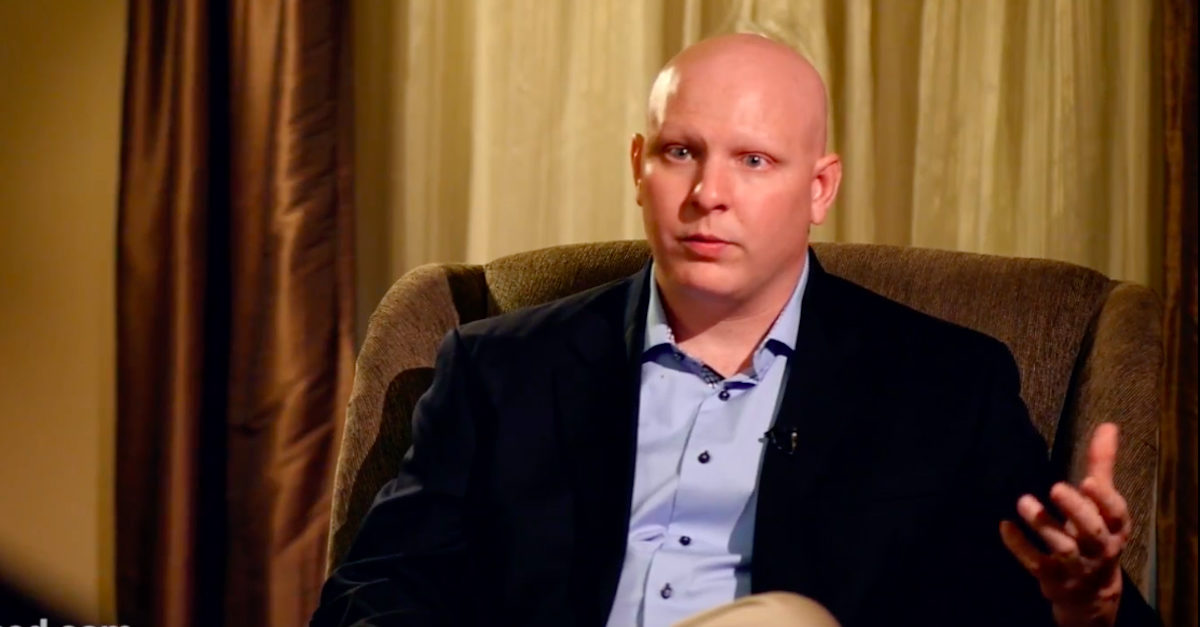
Plaintiff Christopher Doyle
A federal judge on Friday dismissed a lawsuit challenging the state of Maryland’s law banning licensed practitioners from engaging in conversion therapy treatment with minors. The legislation was signed into law by Maryland Gov. Larry Hogan (R) in May of 2018.
The lawsuit was initially filed by Christopher Doyle, a mental health therapist who teaches at Patrick Henry College in Virginia. He claimed the law infringed upon his First Amendment rights to free speech and free exercise of religion.
In a 25-page decision, which you can read in full below, U.S. District Judge Deborah Chasanow ruled that the prohibiting conversion therapy, which is a practice aimed at changing minors’ homosexual orientation, did not violate any constitutionally protected rights.
With regard to free speech, Chasanow reasoned that because the law only applies to professional therapists already subject to generally applicable licensing and regulatory rules in the course of their work, the government may restrict dangerous practices within that professional community.
“Although [this law] regulates speech by prohibiting the use of language employed in the process of conducting conversion therapy on minor clients, it ‘does not prevent licensed therapists from expressing their views about conversion therapy to the public and to their [clients],’” Chasanow wrote. “Most importantly, [this law] does not prohibit practitioners from engaging in any form of personal expression; they remain free to discuss, endorse, criticize, or recommend conversion therapy to their minor clients.”
Chasanow also stressed that the government’s reason for banning the practice was supported by empirical research and expert opinions from within the professional community, which demonstrated a clear consensus that the practice presented a danger to children.
“These sources indicate that conducting conversion therapy on minors could potentially harm their emotional and physical well-being and, thus, prohibiting the practice of conversion therapy on minors would abate the harmful outcomes caused by conversion therapy,” she wrote.
Doyle also argued that the law targeted his sincerely held religious beliefs regarding human sexuality and gender by proscribing him from offering counseling consistent with those beliefs.
Chasanow rejected that argument, reasoning that the law was religiously neutral and had only an incidental effect on any religious practices.
“The First Amendment provides that ‘Congress shall make no law respecting an establishment of religion, or prohibiting the Free Exercise thereof,'” the judge wrote. “The First Amendment does not, however, provide absolute protection to engage in religiously motivated conduct.”
“[A] law lacks neutrality if it ‘targets religious beliefs’ or if its ‘object . . . is to infringe upon or restrict practices because of their religious motivation,'” the judge continued. “[This law] prohibits all licensed practitioners from engaging in conversion therapy without mention of or regard for their religion. Thus, the statute is, at a minimum, facially neutral.”
Doyle was represented by attorneys from Liberty Counsel, a Christian legal advocacy organization that promotes litigation related to evangelical Christian values.
The group responded to the ruling by saying the judge “ignored binding Supreme Court precedent and issued an opinion dismissing Liberty Counsel’s lawsuit seeking a preliminary and permanent injunction against Maryland’s law prohibiting minors from receiving voluntary counseling from licensed professionals to reduce or eliminate unwanted same-sex attractions or gender confusion.”
Liberty Counsel said it will “immediately appeal this decision to the Fourth Circuit Court of Appeals.”
Doyle v. HOGAN et al by Law&Crime on Scribd
[image via YouTube screengrab]